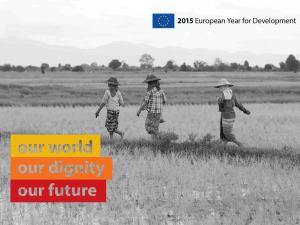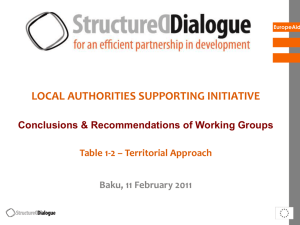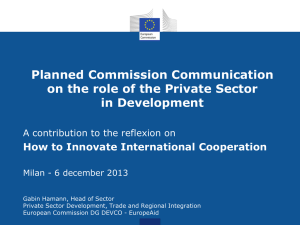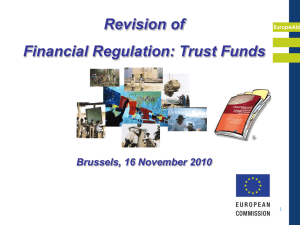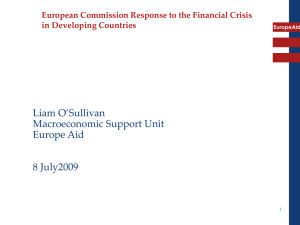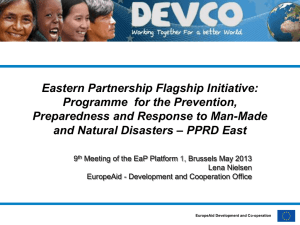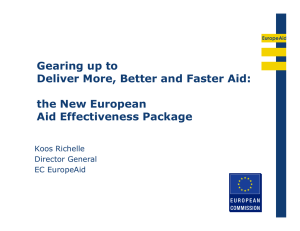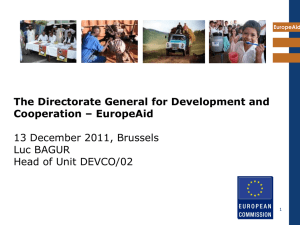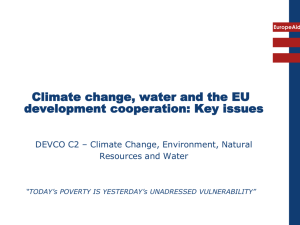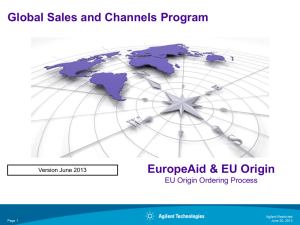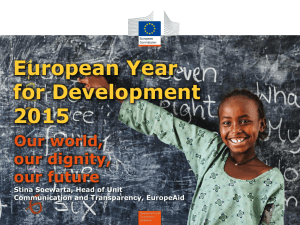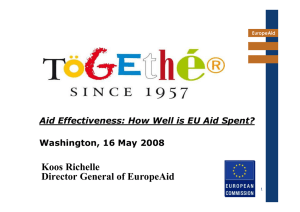DECVO F2 presentation by S. Kodsi
advertisement
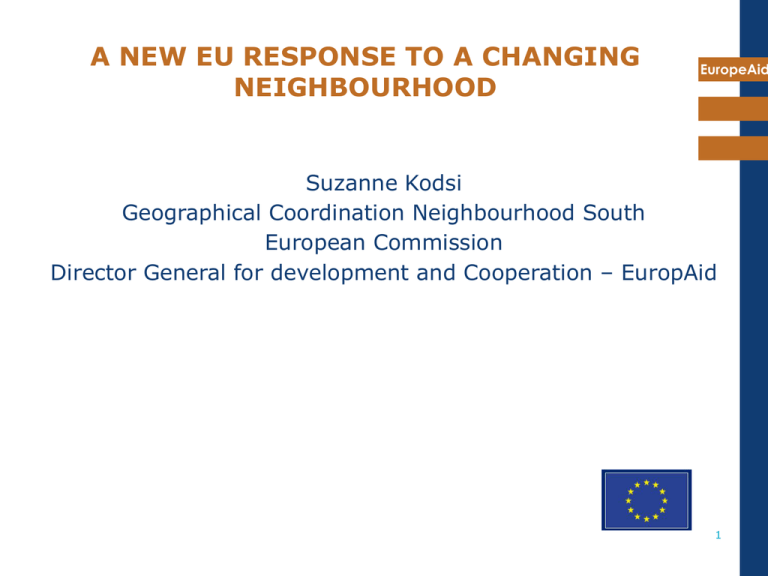
A NEW EU RESPONSE TO A CHANGING NEIGHBOURHOOD EuropeAid Suzanne Kodsi Geographical Coordination Neighbourhood South European Commission Director General for development and Cooperation – EuropAid 1 New ENP proposal adopted on 25 May 2011 EuropeAid Jointly proposed by the High Representative of the Union for Foreign Affairs and Security Policy and by the European Commission - COM (2011) 303 Builds on ENP experience and achievements since 2004 – COM (2010) 207 Taking Stock of the ENP Follows an in-depth ENP review launched in July 2010, conducted in cooperation with partner countries, Member States and civil society organisations; Gives further substance to the EU response to the Arab Spring, the Partnership for Democracy and Shared prosperity with the Southern Mediterranean adopted in March 2011- COM (2011) 200 Takes advantage of the potential offered by the Lisbon Treaty to broaden cooperation with neighbours in an integrated and more effective manner. 2 Underlying principles of the partnership EuropeAid Main objective: to promote deep and sustainable democracy Partnership based on: mutual accountability (more clarity about respective commitments) Differentiation (more adapted to specific countries circumstances) conditionality (« more for more ») 3 The new approach proposed aims to: EuropeAid 1. Provide greater support to partners engaged in building democratic societies; 2. Support more effectively inclusive economic development; 3. Strengthen the two regional dimensions of the ENP (South and East); 4. Provide the mechanisms and resources to deliver these objectives (additional funds) 4 Support for partnership, reforms and inclusive growth (SPRING) for the southern Neighbourhood EuropeAid SPRING is designed as a vehicle for the provision of additional support to partner countries in the southern Mediterranean region. Main aim is to respond to the socio-economic challenges that partner countries are facing by making funds available to those who truly committed to establish deep and sustainable democracies. Spring Funds will be made available using the ‘morefor-more' approach (conditionality). 5 SPRING Countries Allocations EuropeAid • SPRING is an umbrella multi-country programme. • Total budget €350million (€65million for 2011 and € 285 million for 2012 (could be extended to 2013). • Main objectives: Support democratic reforms and institution building , sustainable and inclusive economic development. • Allocation is based on assessment of countries progress in building and consolidating deep and sustainable democracy and on needs (differentiation). 6 Assessment of progress towards « deep democracy » EuropeAid What is « deep democracy » ? Deep democracy criteria are identified in the Joint Communication of 25 May 2011 as: • • • • • • Free and fair elections; Freedom of association, expression and assembly; Free press and media; The rule of law administered by an independent judiciary; Fighting against corruption; Security and law enforcement, sector reform (including the police) and the establishment of a democratic control over armed forces and security forces. 7 Assessment of progress towards « deep democracy » EuropeAid • Countries assessment will rely on the above indicators, on the most recent ENP Progress Reports, on the EU's own evaluation of the most recent developments and could also include indicators compiled by international organisations (i.e: WB Governance indicators) 8 “More for more” approach EuropeAid • The "more-for-more" basis, defined in the 8 March Communication as "an incentive-based approach based on differentiation: partners countries that go further and faster with reforms will be able to count on greater support from the EU". • Additional funds come on top of funds made available through existing Country Strategy Papers (CSPs) and the national Indicative programmes (2011-2013) which remain valid 9 IMPLEMENTATION EuropeAid • Implementation modalities allow for flexibility and for rapidity of response – for different types of support involving different types of aid modality to be provided to different partner countries depending on priorities and urgent needs and the most appropriate means of implementation. 10 IMPLEMENTATION EuropeAid • Initiatives supported will complement ongoing activities supported by EU or Member States, as well as by other donors. Initiatives will be identified by EU Delegations working closely with partner governments, Member States and international stakeholders. • Close collaboration between HQ and EU Delegations will be in place to ensure (1) an appropriate response to the priorities in each country and (2) adequate monitoring of democratic processes, which form the basis of financial allocations. 11 IMPLEMENTATION EuropeAid • Tunisia is the 1st beneficiary country from SPRING funds. • €20 million were allocated , half of this amount were used to increase the EU's contribution (from €90million to €100million) to the economic recovery support programme "Appui à la Relance“. • the remaining €10 million will be made available to support Tunisia's reform priorities "support the transition and the rule of law". priority issues: democratic governance, the reform of the security sector, media and decentralization. 12 IMPLEMENTATION EuropeAid • DEVCO with EEAS are undergoing country analysis along with consultation exercise with EU delegations in the Neighbourhood South to identify possible initiatives to be funded under SPRING fund for 2011 and 2012 available budget. 13 EuropeAid THANK YOU 14
